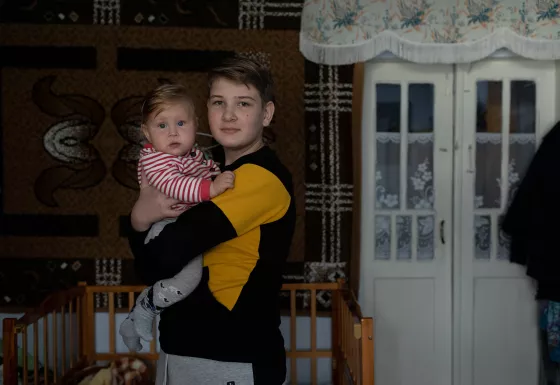The day the invasion began, Svetlana was heavily pregnant with her daughter. She heard an explosion and remembers being terrified. When her husband called a friend of theirs who works for the Ukrainian military, he said “get your family out, it’s started.” Svetlana and her husband had no choice but to pack up her family and leave immediately.
As the fighting intensified, Svetlana and her family sought shelter in her mother-in-law’s basement. It was dark and cold, and the sound of explosions and fighting intensified over the course of the night. Svetlana became increasingly worried. Despite not being due for another two weeks, the stress and fear caused Svetlana to go into early labour. She had contractions in the basement for four hours before she and her husband made the agonising decision to travel above ground to the hospital for the daughter he had always wanted. Svetlana remembers the dangerous journey as she looked out of the window and saw fresh bomb craters on the road to the hospital.
Due to the stress and fear I experienced, I gave birth to my baby two weeks earlier that it was due. It wasn't so much stress as it was fear. The fear was so big that I can’t convey.Svetlana
Not long after giving birth to her daughter in a make-shift bomb shelter underground in the hospital, Svetlana and her children fled Ukraine. She had to leave everything behind, including her husband, her home, and life as she knew it. They could only take what they could carry. Svetlana now lives in a small rural, Moldovan house with her mother, son, and baby daughter. The small four room house is poorly insulated, the electricity is unreliable, and there is no running water, central heating or indoor toilet. Her life couldn’t be more different to before the war.
Without easy access to fuel or water, Svetlana relies on her son to help with household chores. He fetches water from a nearby well and collects twigs to burn over a small stove. This helps them to keep warm, gives them something to cook with and affords them boiled water to wash themselves.
Families like Svetlana’s now have little to no access to the money they need to survive. With winter just around the corner, Svetlana says “to spend the winter here is a nightmare. I think it’s going to be horrible. We are very concerned about the winter, really worried.”
When we left, his Daddy said to him “you’re a man, you’re the eldest of the children, you have to take care of our girls.Svetlana
Since their move, her son has had a difficult time adapting to their new life.
“In general, he is an ordinary teenager, he misses his friends, wants to live a normal life, as we all want. Sometimes he cries. He misses his father very much and is very worried about him.”
The trauma of war can have a profound impact on a child’s mental health. Svetlana’s son finds it particularly hard at night. Svetlana recalls how her son now wakes up in the night when he hears loud noises: Her son says "Mum, what's going on?" And then he begins to look with his eyes for where to hide. When we moved here and he first heard thunder, his face went pale in a second. And he said, “Mum, where do we run to?”
Despite the war tearing apart Svetlana’s family, she hopes to return home and wishes for them to all be together this Christmas. She hopes her children will grow up in a peaceful city, but most of all she wishes for the war to end, “That’s all. No plans. Just dreams.”
Our partners at CCF are working around the clock to help vulnerable families like Svetlana’s, by providing them with vouchers for food and essential items, so they have the freedom and independence to buy what they need to survive, including nutritious food, warm clothes, nappies and blankets.


